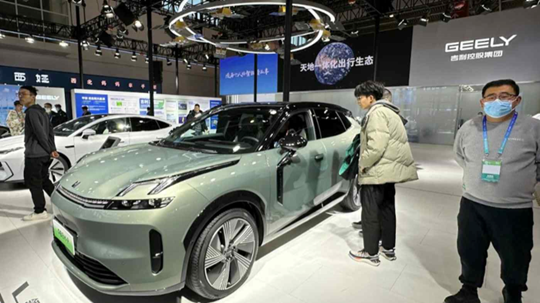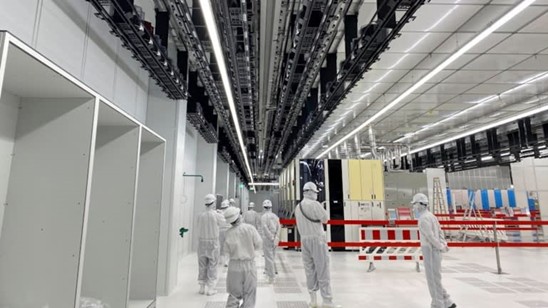EV POWERHOUSE CHINA TO SET OWN STANDARDS FOR AUTOMOTIVE SEMICONDUCTORS

Geely is among the Chinese automakers pursuing its own semiconductor development capabilities.
BEIJING -- China has moved to set its own standards for semiconductors used in electric vehicles and self-driving cars as it seeks to replace imports of these vital components with domestic production.
The government has called on industry to create technological standards for more than 30 important automotive semiconductors by 2025 and more than 70 types by 2030, according to guidelines issued this month by the Ministry of Industry and Information Technology.
The guidelines, which were issued to trade groups on Jan. 8, seek to ensure safety and reliability by providing for performance tests of semiconductors used in finished vehicles and core systems.
An auto industry source said the government "will probably use the standard-setting process to instruct automakers to use domestically made semiconductors."
China aims to build a a homegrown semiconductor supply chain that is safe from the threat of U.S. sanctions. Semiconductors are a weak link in China's drive to become an automotive superpower by using its head start in the shift from gasoline-fueled cars to EVs.
Sales of new autos in China grew 12% in 2023 to 30.09 million vehicles, and exports reached nearly 5 million vehicles, putting China ahead of Japan as the world's top auto exporter, according to the China Association of Automobile Manufacturers. China led global growth in EVs and other new-energy vehicles last year, with a 38% increase in sales to 9.49 million vehicles. New-energy vehicles, a Chinese term, include plug-in hybrids and fuel cell vehicles.
EVs and self-driving cars require more semiconductors than conventional autos. According to a major Chinese automaker, EVs are loaded with about 1,300 semiconductors each, compared with a little under 500 in gasoline-powered cars.
Level 4 autonomous cars, which can operate without driver input under certain conditions, have more than 3,000 semiconductors, Chinese auto industry data provider Gasgoo reports.

Germany's Infineon Technologies is the leading supplier of automotive semiconductors by market share, according to Chinese news source Jiwei. Next is NXP Semiconductors of the Netherlands, followed by Japan's Renesas Electronics.
With government encouragement, Chinese automakers are developing their own semiconductors. Zhejiang Geely Holding Group, the parent of Volvo Cars, puts proprietary semiconductors into its sport utility vehicles. Automotive semiconductor development is also a priority for leading Chinese contract chipmaker Semiconductor Manufacturing International Corp. (SMIC), according to a senior executive.
But China is still a long way from self-sufficiency. In power semiconductors, which regulate electric current and are vital to EV performance, domestic production meets only about 15% of China's needs, according to Gasgoo. In advanced chips -- the kind needed for autonomous driving -- Chinese production is below 5%.
China's overall self-sufficiency in automotive semiconductors is estimated at around 10%, compared with about 20% for semiconductors in general.
The number of Chinese companies developing automotive semiconductors has reached about 300, but domestic technology has not kept pace with the auto industry's needs, and China remains dependent on imports. Worldwide, the industry is led by Infineon Technologies of Germany, NXP Semiconductors of the Netherlands, Japan's Renesas Electronics and U.S. chipmaker Texas Instruments.
Many automotive semiconductors are not subject to U.S.-led export controls because they are less advanced than chips used for artificial intelligence and other high-tech defense-related applications. But China's access to foreign supplies of semiconductors for cars may yet be restricted depending on how relations with the U.S. play out.
"With the rise of trade protectionism, automotive semiconductors have become a focus of global competition," Fu Bingfeng, executive vice president of the China Association of Automobile Manufacturers, told a December 2023 conference on semiconductors hosted by the trade group in Wuxi.
"We can create a new automotive semiconductor industry," Fu said.
More than a year earlier, in November 2022, Miao Wei, a former industry ministry with powerful connections to the auto industry, had urged industry leaders at a meeting in Shanghai to switch all of their semiconductor procurement to domestic sources.
Chinese media have quoted Gao Xiang, a researcher involved in automobile policy, as saying that government support and other measures can make it possible to replace even extremely technically difficult semiconductors with domestic production in five to 10 years.
Statement: The content of this article comes from the Internet and is only for learning and communication. All opinions belong to the original author and do not represent support or approval for the opinions. If your rights are infringed, please contact us in time to delete it.


